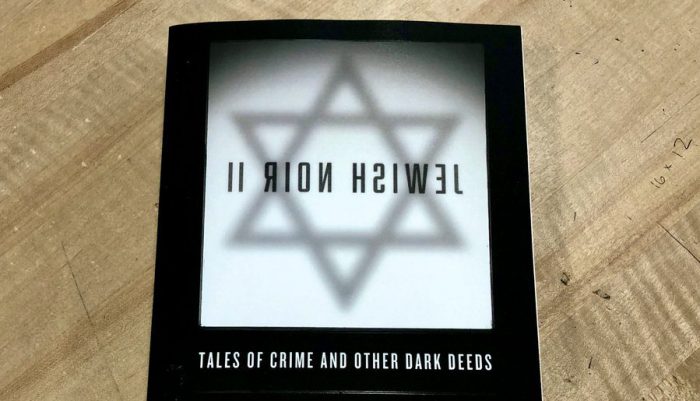Book Review: Jewish Noir II — Tales of crime and other dark deeds
Reviewed by Jeffrey Sanzel
Pinpointing “noir” is challenging. Generally, explanations include terms such as “tough,” “cynical,” “dangerous” and “bleak.” However, these words could also apply to a range of works. This crime genre, which leans towards the dark and pessimistic, has an alchemical combination that defies a narrow definition. While often associated with hardboiled detective fiction (Dashiell Hammett, Raymond Chandler, Mickey Spillane), this is not necessarily an accurate association. Conceptually, “noir” focuses on flawed individuals who are often morally questionable or corrupt. Greed, lust, and jealousy mix with societal alienation resulting in situations from which the characters cannot extricate themselves.
In any case, defining “noir” is not essential to appreciate the exceptional Jewish Noir II (PM Press), subtitled “Tales of Crime and Other Dark Deeds.” Edited by Kenneth Wishnia and Chantelle Aimée Osman, the collection of twenty-three compelling, sharp, and haunting tales encompasses an eclectic and page-turning mix.
 As indicated by the title, the over-arching element is Judaism. But the editors offer a range of perspectives, from religious to cultural. Some stories feature Jewish identity at their core; in others, the elements remain peripheral. In an age steeped in fear and a global rise in antisemitism, many of these short pieces — subtly and directly — address the toxicity embroiled therein. Osman indicates in the introduction, “What I do know is that this anthology is important. And the stories in this book apply to everyone.”
As indicated by the title, the over-arching element is Judaism. But the editors offer a range of perspectives, from religious to cultural. Some stories feature Jewish identity at their core; in others, the elements remain peripheral. In an age steeped in fear and a global rise in antisemitism, many of these short pieces — subtly and directly — address the toxicity embroiled therein. Osman indicates in the introduction, “What I do know is that this anthology is important. And the stories in this book apply to everyone.”
“Taking Names” (Steven Wishnia) uses the anniversary of the Triangle Shirtwaist Factory Fire as a framing device to highlight “corruption [as] the most truly diverse aspect of New York City politics.” Like many of the stories, the language is rich and distinct: “The spokesperson for the Laborers, a skinny guy who looked like he’d lifted more textbooks than cinderblocks …” Antisemitic backlash from a reporter’s story results in a tragic and violent turn. (Later in the volume, “Triangle” (Rabbi Ilene Schneider) uses the tragedy in a wholly different and perfectly unsettling tale of an Angel of Death nurse.)
“Sanctuary” (Doug Allyn) focuses on the horrifying impact of a newly graduated medical student and the liberation of Buchenwald. A granddaughter inherits a necklace and a packet of blood-covered documents in “The Cost of Something Priceless” (Elizabeth Zelvin). With the traditional noir edge, “Only a fool can expect the cost of acquiring treasure to be paid in full. Blood has a tendency to leak and go on leaking. So do reputation and deceit.” The story of twin generational treachery concludes with a sharp stinger of a final line. The brief but potent “The Black and White Cookie”(Jeff Markowitz) takes on segregation.
The book deals with Jewish people worldwide — even as far as Trinidad and China. Violence is consistently present, both casual and deliberate. Humor flows liberally throughout, often to create an illusion quickly shattered with a deft plot twist. “Wishboned” (Jill D. Block), with its mix of fantasy and Philip Roth, deftly skewers the bar mitzvah sphere: “That was his cue, once again, that paying for a bar mitzvah is like buying a brand new sports car and driving it straight off a cliff.”
“The Shabbes Goy” (Craig Faustus Buck) is one of the book’s truly noir entries. The Jewish elements weave tautly into a narrative of plotting femme fatales and an abusive husband. “To Catch a Ganef” (Lizzie Skurnick) blends Alfred Hitchcock Presents and O. Henry in a smartly multicultural story. “Paying the Ferrymen” (E.J. Wagner), an account of a wronged wife, also feels like an ode to that 1950s series. “Inheritance” (Terry Shames) leans into a Ladies in Retirement tone, with a nursing home setting and vengeful relatives.
Drawing on biblical sources, “Brother’s Keeper” (Eileen Rendahl) presents a private investigator and a moral dilemma utilizing the Cain and Abel story as both a parallel and mirror image. In contrast, “The Almost Sisters” (Ellen Kirschman) contains a more ethnic reflection: “If there is a gene for pessimism it will be in Jewish blood. I heard it a million times, keynehore, don’t relax, don’t get too happy, something bad is coming.”
“Crossover” (Zoe Quinton) broods on conversion and a suspicious mikvah death, the permeating darkness in the water giving a sense of unease.
One of the most unusual entries is editor Kenneth Wishnia’s “Bride of Torches,” a bloody account of tribal battles. While the vivid tale reaches back into ancient history, its unique voice helps fit in with this modern anthology. Equally remarkable is “The Just Men of Bennett Avenue” (A.J. Sidransky), a mystical procedural drama.
“The Hanukkah Killer” (Robin Hemley) balances the portrait of a murderer — “eyes that, if they were windows to his soul, you would have wanted nailed shut” — with the vivid portrait of an old neighborhood, with its family illness, dysfunction, and poverty.
The closing story, “Hunter” (Jen Conley), follows a therapist struggling with a threatening and most likely sociopathic patient. The details are striking and disturbing — the eeriness of a burning cigarette suggesting an ominous watcher — and contrast brilliantly with the social issue — a community’s reaction to the encroachment of Orthodox families. The story’s final line is appropriately chilling and the perfect coda to this collection.
While Jewish Noir II takes mild liberties with the definition, this is a minor quibble in this amazing collection of tightly written, powerful, and must-read stories. Pick up a copy online at Amazon.com or BarnesandNoble.com.
In conjunction with the book, Emma S. Clark Memorial Library, 120 Main St., Setauket will host Stories Light and Dark: An Evening of Jewish Noir on Thursday, Oct. 13 from 7 to 8:30 p.m. Join Kenneth Wishnia and other contributors for a spirited discussion of the diverse themes in the Jewish Noir II anthology. Copies of the book will be available for sale at the event at a discount, plus a bonus story collection offered free with each purchase. To register, call 631-941-4080







